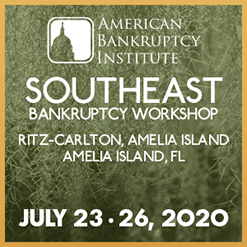| |
| |
| vol 17, num 1 | April, 2020 |
| |
|
|
| |
|
|
|
|
|
| |
| The Circuit Split on Medicare: Jurisdictional Uncertainty in the Age of Coronavirus |
| The COVID-19 pandemic is straining already-troubled hospitals and other health care providers. Many will seek refuge in chapter 11, and bankruptcy courts nationwide will be called upon to adjudicate a host of issues, many time-sensitive, as health care providers struggle to provide services. Disputes regarding transferability of critical Medicare provider agreements are inevitable. Unfortunately, there is no judicial consensus on Medicare-related bankruptcy law, including the existential question of jurisdiction. Given the current health crisis and the concomitant need to permit hospitals to move quickly to reorganize, a national resolution of
this split — be it via the Supreme Court or Congress — is necessary. Given the current state of affairs, congressional action may be the only timely solution. |
| |
|
|
|
|
| |
|
| |
| Short Case Analysis: True Health Diagnostics LLC v. Azar, et al. (In re THG Holdings LLC), Adv. Proc. No. 19-50280 (JTD) (Bankr. D. Del.) |
| The lifeblood for many hospitals is the prompt reimbursement by Medicare and Medicaid programs for services provided; this is particularly true for nonprofit providers. As a result, the ability to compel reimbursement payments from the Centers for Medicare and Medicaid Services (CMS) or local and state Medicaid providers through the bankruptcy court has emerged as a significant issue for health care providers in financial distress. In a recent decision, True Health Diagnostics LLC v. Azar, et al. (In re THG Holdings LLC), the U.S. Bankruptcy Court for the District of Delaware enforced the automatic stay and ordered the federal
authority to release all Medicare payments withheld post-petition and continue to make payments.
The outcome of this case will likely have a significant impact on health care providers as they consider protections available to continue to receive reimbursements.
The True Health Opinion
True Health represents an attempt by a debtor to compel post-petition reimbursements from CMS through the operation of the automatic stay, notwithstanding the government’s assertion that the “police power exception” permitted suspension of post-petition Medicare payments. |
| |
|
|
|
|
| |
|
| |
| Management of Large Liabilities of Health Care Companies Through Bankruptcy |
| Two recent decisions involving health care companies demonstrate how reorganization under chapter 11 of the Bankruptcy Code can be used to manage large liabilities. Chapter 11 contains the provisions of the Bankruptcy Code that authorize bankruptcy courts to approve reorganization plans so that companies can continue in business with relief from life-threatening claims. Jurisdiction over bankruptcy matters is conferred on the U.S. district courts, which have the authority under 28 U.S.C. § 157(a) to refer any or all cases or proceedings to the bankruptcy courts. Such authorization typically takes the form of standing orders of reference,
entered by the district courts, allowing bankruptcy courts to hear virtually all matters arising in a bankruptcy case. But because bankruptcy courts were created under Article I of the U.S. Constitution, rather than Article III, they lack authority to resolve certain disputes with finality. If certain matters based on state law and involving private rights fall with the Stern proscription, a bankruptcy judge must, much like the process followed by magistrate judges, submit proposed findings of fact and conclusions of law to the district court for final determination. In addition, particularly since Stern, there have been additional challenges to the breadth of bankruptcy courts’ jurisdiction. |
| |
|
|
|
|
| |
|
| |
| Litigating the Appointment of a Patient Care Ombudsman |
| The Code requires the court to appoint a patient care ombudsman (PCO) in every case under chapters 7, 9 and 11 where the debtor is a health care business, unless the court makes a finding that such an appointment is not necessary for the protection of patients. The decision of whether to make such an appointment is significant: It can impact patient safety, administrative costs and the likelihood of success of the case. Because of the short time frames dictated by statute and rule, all parties must evaluate the necessity of a PCO early in the case. |
| |
|
|
|
|
| |
|
|
|
|
|
|
|
|
|
| |









